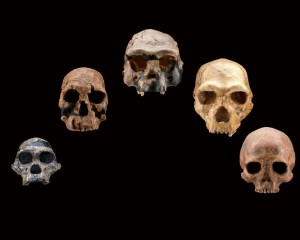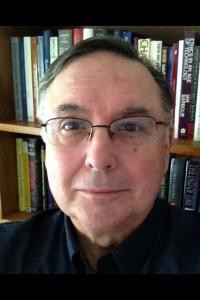Exploring Human Origins: What Does It Mean to Be Human?

Smithsonian’s Human Origins Program
The Wyckoff Public Library will be hosting the traveling exhibit, Exploring Human Origins along with a variety of programs for people of all ages from October 17 – November 10, 2016. Please register for programs through our calendar.
Exploring Human Origins is a 1,200-square-foot display with panels, interactive kiosks, engaging media presentations, 3-D skull casts and a life-sized Neanderthal mother and child statue. Based on the Smithsonian Institution’s exhibit hall in the National Museum of Natural History, Exploring Human Origins: What Does It Mean To Be Human? seeks to shed light on what we know about human origins and how we know it.
The programs and displays trace the evolutionary journey of humans — from walking upright, creating technology and eating new foods, to brain enlargement and the development of symbolic language and complex societies — advancements that define the unique position of humans in the history of life.
The topic of human evolution can be controversial. The exhibit and public programs welcome different perspectives on evolution and seek to foster a positive dialogue and a respectful exploration of the science. People of all beliefs are encouraged to explore the exhibition as it delves into human origins in a way that is understandable, fulfilling, captivating and relevant.

Smithsonian’s Human Origins Program
Exploring Human Origins: What Does It Mean to Be Human? was organized by the Smithsonian’s National Museum of Natural History in collaboration with the American Library Association Public Programs Office. This project was made possible through the support of a grant from the John Templeton Foundation and support from the Peter Buck Human Origins Fund.

Events
The Library will host a variety of programs for people of all ages in conjunction with the exhibit. Presenters include staff from the Smithsonian Institutions, Bergen Community College, Ramapo College, Rutgers University, William Paterson University, scientists, art instructors, and residents.
The exhibition and programs are free. Please click on the Sign Up button to register for specific programs. A brochure with descriptions of the programs is available at the library or as a downloadable events guide.
Prior Programs
The Reluctant Mr. Darwin Book Discussion
September 20 from 7:00—8:30 PM
Join us for a special meeting of the Wyckoff Library Friends Book Group. We’ll be discussing Charles Darwin and his theory of evolution as presented in the book The Reluctant Mr. Darwin by David Quammen. Please come to the Reference Desk to borrow a copy of the book before the discussion.
Official Exhibit Opening: An Evening of Science (video below)
October 18 from 7:00—9:00 PM
Join Dr. Briana Pobiner, paleoanthropologist and educator in the Smithsonian’s Human Origins Program, as she explores the main themes and messages of the traveling exhibit in a program for the general public. The talk and following conversation will explore how fossils, archaeological remains, and genetic studies shed light on our connection with the natural world and the origins of sharing, caring, and innovation.
Clergy Tour & Discussion (CLERGY ONLY)
October 19 from 11:00 AM—12:30 PM
This is a dedicated, private time for area clergy members to view the exhibit. Dr. Connie Bertka, Dr. Jim Miller and Dr. Rick Potts will join the clergy in the exhibit space to discuss any questions clergy may have about the exhibit’s presentation of the science of human origins.
Educators Workshop (EDUCATORS ONLY)
October 20 from 9:00 AM—12:30 PM
Dr. Briana Pobiner, who leads the Human Origins Program’s education and outreach efforts, and Dr. Connie Bertka, co-chair of the Smithsonian Institution’s Broader Social Impacts Committee, will present a workshop on human evolution for science educators. The workshop is for classroom teachers, science, nature center, and museum educators, homeschooler instructors, and other local educators. It will feature exploration and hands-on practice in presenting the Human Origins Program resources provided for each community.
Community Conversation: What Does Human Evolution Mean to You?
October 20 from 7:00—9:00 PM
Join Drs. Connie Bertka and Jim Miller, co-chairs of the Smithsonian Institution’s Broader Social Impacts Committee, as they encourage a community conversation about human evolution that helps us to understand each other’s perspectives, to identify areas of common interest or concern, and to explore the variety of ways human evolution connects to personal meaning.
Paleo Diet & Lifestyle with Mike D
October 22 from 2:00—3:00 PM
Have you heard about Paleo diets & lifestyle? Do you want to learn more? Mike DiLandro is a living, breathing Paleo success story. Mike is deeply passionate—compelled really—to introduce Primal living to virtually anyone who will listen!
Inherit the Wind Movie Showing and Discussion
October 24 from 2:00 – 4:00 PM
The Evolution vs. Creationism argument is at the center of Inherit the Wind. The play, turned movie, was inspired by the “Scopes Monkey Trial” of 1925. Names of characters and places were changed, but the court transcripts were incorporated into the script. The film was released in 1960 starring Spencer Tracy, Fredric March, Gene Kelly, and Dick York.
Lenape Lifeways Family and Village Life (Children grades 1-8)
October 26 from 4:00—5:00 PM
Learn about the earliest inhabitants of this area, Lenape Indians. Details about traditional Lenape life focusing on everyday village activities and the roles of men, women and children within the family and community will be presented. Drawings and photographs show how the Lenape dressed, built shelters, grew crops, fished, hunted, cooked, made tools and weapons, treated disease, grew up and more.
The Montclair Art Museum Art Truck
November 2 from 4:00—6:00 PM
Museum staff will work with children to create an art project.
Prehistoric Art Lecture with Sue Altman
November 2 from 7:00—8:00 PM
This lecture explores the earliest known examples of art, including drawing, sculpture and architecture. You will see the fascinating cave paintings in France, some important stone figurines and the rudiments of architectural forms like the post and lintel structures of Stonehenge. The talk will also delve into the evidence of the beginnings of civilization in the Ancient Near East-the Sumerians, Hittites and Babylonians, among others. These artifacts tell us an enormous amount about what it means to be human.
Fossils: Perfectly Petrified
November 3 from 7:00—8:00 PM
A local collector will discuss his extensive fossil collection. These fascinating specimens date back 500 million years and include trilobites, ammonites, skulls, and more.
Climate Change Past Present and Future
November 9 from 7:00—8:00 PM
Rutgers professors Gail Ashley, Distinguished Professor of Geological Sciences and Dr. Tony Broccoli Co-Director, Rutgers Climate Institute Environmental Sciences will discuss their research as it relates to human evolution.
Smithsonian Presenters
Connie Bertka, Ph.D.
Connie Bertka received her doctorate in geology from Arizona State University and a Master of Theological Studies from Wesley Theological Seminary in Washington, D.C. She is a planetary scientist and has had a long-term scholarly and pragmatic interest in the relationships between science and religion and their influence on an individual’s understanding of science. She is currently an independent scholar and consultant with Science and Society Resources, LLC. She is the co-chair of the Smithsonian Institution.
Jim Miller, Ph.D.
Jim Miller is the president of the Presbyterian Association on Science, Technology and the Christian Faith. He is an honorably retired ordained minister of the Presbyterian Church (USA) with an MDiv from Union Theological Seminary in Virginia and a Ph.D. in theology from Marquette University. Most of his ministry was served as a minister in higher education at Michigan Technological University, the University of Pittsburgh, and Carnegie Mellon University. However, immediately following seminary, Jim worked in the School of Engineering at North Carolina State University. From 1996-2006 he was the Senior Program Associate for the Program of Dialogue on Science, Ethics, and Religion of the American Association for the Advancement of Science (AAAS). Jim currently serves as co-chair of the Broader Social Impacts Committee of the Human Origins Initiative at the Smithsonian Institution’s National Museum of Natural History.
Briana Pobiner, Ph.D. 
Briana Pobiner is a paleoanthropologist and educator in the Smithsonian’s Human Origins Program. She received a master’s degree and a doctorate in anthropology from Rutgers University. Her research interests center on the real “paleodiet” — the evolution of human diet, with a focus on meat-eating. Her doctoral research focused on documenting patterns of chewing damage left by living large African carnivores while eating their prey, and looking for these patterns on fossils from prehistoric sites in eastern Africa (Koobi Fora, Kenya and Olduvai Gorge, Tanzania). She also studied butchery marks made by ancient stone tools at these sites to determine whether early humans were getting access to the meaty parts of carcasses, or scavenging the scraps left over from carnivores.
Rick Potts, Ph.D. 
Rick Potts is a paleoanthropologist who directs the Human Origins Program at the Smithsonian’s National Museum of Natural History, where he also holds the Peter Buck Chair in Human Origins. Potts received his doctorate in biological anthropology from Harvard University in 1982, after which he taught anthropology at Yale University and served as curator of physical anthropology at the Yale Peabody Museum. Since joining the Smithsonian in 1985, Dr. Potts has dedicated his research to piecing together the record of Earth’s environmental change and human adaptation. His ideas on how human evolution responded to environmental instability have stimulated wide attention and new research in several scientific fields. Dr. Potts is curator of The David H. Koch Hall of Human Origins at the Smithsonian’s National Museum of Natural History.


